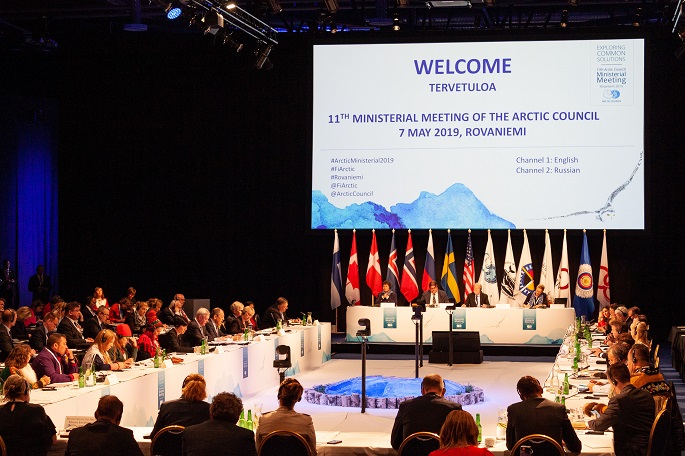Arctic council ends sans joint declaration as US vetoes
Published : 08 May 2019, 01:13
Updated : 08 May 2019, 09:58
The 11th Arctic Council Ministerial Meeting ended Tuesday in Rovaniemi, Finland without issuing any joint declaration as the United States was the lone member that disagreed to the language on fighting climate change in the draft.
Such a failure to reach to a joint declaration was the first in the 23-year history of the council, although the remaining seven member states – Canada, Denmark, Finland, Iceland, Norway, Russia, and Sweden – approved the draft declaration.
US Secretary of State Mike Pompeo in his speech expressed concern over the Chinese impact on the environment.
He said, “The Trump administration shares your deep commitment to environmental stewardship. In fact, it’s one reason Chinese activity, which has caused environmental destruction in other regions, continues to concern us in the Arctic. The Arctic has always been a fragile ecosystem, and protecting it is indeed our shared responsibility.”
According to Pompeo, “Collective goals, even when well-intentioned, are not always the answer. They are rendered meaningless, even counterproductive, as soon as one nation fails to comply,” he added.
 Earlier on the closing day, the meeting started a speech of the Chair, Finnish Foreign Minister Timo Soini, who said changes would be brought in the agenda.
Earlier on the closing day, the meeting started a speech of the Chair, Finnish Foreign Minister Timo Soini, who said changes would be brought in the agenda.
Instead of a joint declaration, the ministers signed the so-called joint ministerial statement. The document possesses less formal significance; however, it still indicates the collaborative effort of the council’s eight member states.
In his speech, Soini summed up the achievements of the Arctic Council under the Finnish chairmanship. He noted the “very cooperative spirit between the Arctic States and the Permanent Participants of the Arctic Council.”
He spoke of the increased attention the Council paid to the task of reducing black carbon emissions.
“Nowadays the improved meteorological observations help in enhancing climate science as well as in producing services that improve the safety of the people in the Arctic,” said Soini, praising the Arctic Council working and expert groups for producing recommendations on “how to monitor the Arctic ecosystems, and how to reduce pollution and minimize the negative impacts of human activities on the Arctic environment.”
Canadian Foreign Minister Chrystia Freeland shared her enthusiasm about the carbon-emission situation. She said, “It is good news that all the countries that report their black carbon emissions have reported a reduction,”
Freeland also revealed Canada’s funding plans on the Arctic region: “Canada will fund the permanent secretariat of the Arctic Council’s sustainable development Working Group as one part of a broader, more than 28 million dollar, investment in our Arctic foreign policy.”
Danish Foreign Minister Anders Samuelsen in his speech highlighted cooperation on economic development to the benefits of the Arctic population. “We will engage young people in a competition on innovation in the Arctic during 2019 and 2020. The aim is to promote entrepreneurship among young people across the whole Arctic region,” he declared.
Iceland Foreign Minister GuðlaugurÞórÞórðarson spoke about Iceland taking over the chairmanship of the Arctic Council. He thanked Finland for doing a good job as the council chair and said Iceland intends to keep up with it. “You made our job a lot easier and we look forward to building on your outstanding chairmanship and adding new value to the present work,” said Guðlaugur.
In her speech, Norway’s Minister of Foreign Affairs Ine Marie Eriksen Søreide emphasised the need for scientific expertise in the Arctic region. “In order for us to address the challenges facing the region we need the best available scientific knowledge to guide our efforts,” Søreide told the session.
Russian Foreign Minister Sergey Lavrov, in his turn, pointed out that his government sees Arctic as a place of peace, stability and productive cooperation.
“We are open to the widest cooperation in the Arctic, where, as we have stated many times before, there are no reasons for conflicts and attempts to apply military methods to resolve any of the emerging questions,” Lavrov proclaimed.
In her speech, Swedish Foreign Minister Margot Wallström invited those present in the meeting to visit Sweden in the autumn: “In October, Sweden is pleased to co-host with the European Union the Arctic Forum in our northern City of Umeå back to back with the Barents Euro-Arctic Council Ministerial. And I hope to see you there.”
The chairmanship of the Arctic Council has now handed over to Iceland during which term the next ministerial meeting will be held in 2021.


